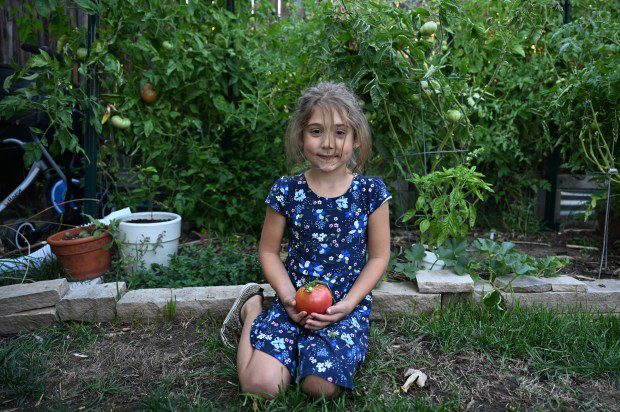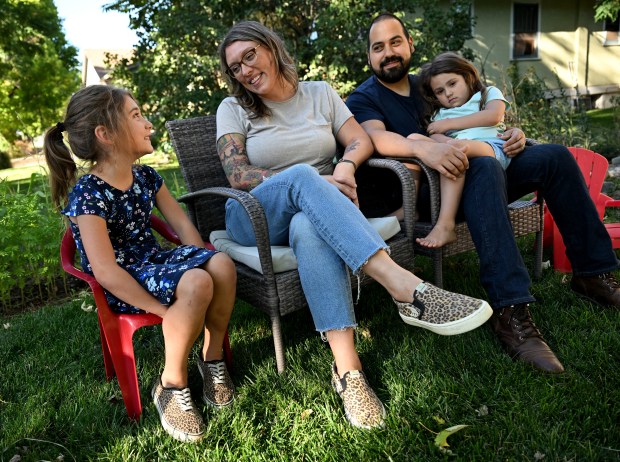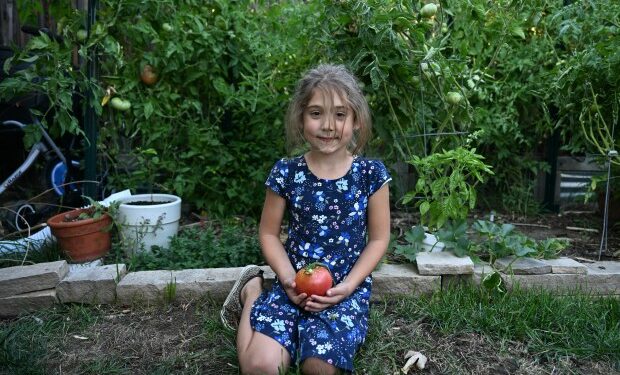At a time when the U.S. Supreme Court has opened the door to greater public funding for private religious schools, a lower court ruling in Colorado could have big implications for the separation of church and state in education.
At the center of the case are two Catholic preschools in suburban Denver that want exemptions from state non-discrimination rules based on sexual orientation and gender identity. The parishes that run the preschools sued the state last year because they didn’t want to have to admit LGBTQ children or children from LGBTQ families if the preschools joined Colorado’s popular new state-funded preschool program.
After a trial in January, a federal judge largely ruled in the state’s favor in June. But the preschools are now appealing — and the case could wind up before the U.S. Supreme Court. The Colorado lawsuit is one of several similar cases unfolding across the country.
If the Catholic preschools win, it’s possible Colorado children could be shut out of some preschools because of their or their parents’ identities.
Brittany, the mother of a 7-year-old transgender girl, choked up as she talked about the lawsuit. Her daughter Naomi is an art-loving, tree-climbing second grader who enjoys reading “Captain Underpants” books and playing pretend with her little sister, who is 4.
“It’s so upsetting that there’s so much hate for our kids,” said Brittany, who is not involved in the lawsuit but represents the kind of family that could be affected by it. She spoke on the condition that her last name not be published to protect her family’s privacy.
“These kids are just kids. They don’t have a political agenda.”
Colorado invited religious preschools to join state program
As Colorado leaders prepared to roll out universal preschool in the fall of 2023, they invited public and private preschools across the state to join the program. Among them were St. Mary Catholic Virtue School in Littleton and Wellspring Catholic Academy of St. Bernadette in Lakewood, the two schools now at the center of the lawsuit.
The “mixed delivery” approach — meaning both public and private schools can participate — helped ensure there were enough seats for all of the Colorado families that wanted one. This year, about 41,000 4-year-olds are getting tuition-free preschool through the program.
But the Archdiocese of Denver wouldn’t let most of the 36 preschools it oversees sign off on the state’s non-discrimination agreement, a requirement to participate.
The sticking point was the agreement’s protections for people based on sexual orientation and gender identity. Officials from St. Mary’s and other religious preschools raised their concerns during meetings with state preschool leaders before the program launched.
That’s when state leaders mentioned an idea they’d come up with to allow religious preschools that joined universal preschool to reserve some or all of their seats for members of their congregations, according to testimony from the trial.
But the Catholic preschools instead wanted the state to exempt them from the parts of the non-discrimination rule covering sexual orientation and gender identity. State officials refused, saying those protections were part of state law.
“In a sense, church leaders want to have their cake and eat it too,” said Bob Shine, associate director of New Ways Ministry, a Catholic group based near Washington, D.C., that advocates for LGBTQ inclusion.
“They want public funding because in most cases the church cannot sustain a lot of its educational or charitable efforts now, so they need the government money, but they don’t want any of the conditions that come with (it).”
In Denver, the archdiocese this month announced the impending closure of Wellspring and two other Catholic schools due to declining enrollment and financial problems. Last year, the archdiocese closed a K-8 school in Aurora.
Supreme Court grows more sympathetic to religious liberty claims
In recent years, the U.S. Supreme Court has become more conservative and more sympathetic to religious liberty claims, often at the expense of arguments favoring a strict separation of church and state.
In a landmark 2022 Maine case called Carson v. Makin, the high court ruled that religious schools can’t be excluded from publicly funded programs if secular private schools are allowed to participate. But the court didn’t clearly address whether states could require those religious schools to agree to non-discrimination rules in order to participate.
“That then tees up this tension,” said Robert Kim, executive director of the Education Law Center. “The religious schools are arguing… ‘Having to abide by those non-discrimination policies violates our religious rights.’ ”
In the Colorado case, Senior U.S. District Judge John L. Kane disagreed with the Catholic preschools on that point in his ruling.
He wrote of Colorado’s non-discrimination rules: “The purpose of the requirement is not to invade religious freedom but to further the implementation of a strongly embraced public value.”
Sarah Taitz, constitutional legal fellow at Americans United for Separation of Church and State, said court decisions often hinge on whether states apply non-discrimination rules in a “neutral and generally applicable” way.
In his 101-page opinion, Kane concluded the state met that threshold.
Mom of trans daughter relieved by ruling on LGBTQ inclusion
Brittany, Naomi’s mother, said she and other parents she’s talked to were relieved by Kane’s decision upholding protections based on sexual orientation and gender identity.
“We were really happy that the ultimate ruling that came out was that you can’t discriminate against our community,” said Brittany, who runs a monthly park play group for transgender children and started the Denver chapter of the national group TransParent.
 Naomi, 7, shows off the family’s prized garden that is full of vegetables at her home in Denver on Sept. 17, 2024. (Photo by Helen H. Richardson/The Denver Post)
Naomi, 7, shows off the family’s prized garden that is full of vegetables at her home in Denver on Sept. 17, 2024. (Photo by Helen H. Richardson/The Denver Post)
Brittany said her family was lucky because when Naomi came out as transgender at age 4, the teachers at her private preschool were supportive. They even helped with Naomi’s social transition at school, including the switch in pronouns and her name change. The family has found the same openness at their public elementary school in Denver.
In both kindergarten and first grade, Naomi told her entire class — with teachers facilitating the conversation — that she was transgender and answered questions from classmates.
“She came home happy and excited and said, ‘Mom, I told my whole class that I was trans and they’re all still my friends,’ ” she said.
When sharing about her daughter’s gender identity, she said, “It’s never the kids that we worry about.”
Brittany said her in-laws are practicing Catholics and when she and her husband broke the news about Naomi’s gender identity, they felt a twinge of uncertainty.
“Specifically because of their faith, we weren’t sure what their reaction was going to be,” she said. “They just told us that they love her no matter what and have been champions for her and other kids like her.”
 Naomi, 7, left, her mother Brittany, father Orlando and little sister MJ, 4, sit together on their front lawn outside of their home in Denver on Sept. 17, 2024. (Photo by Helen H. Richardson/The Denver Post)Catholic preschools want to avoid “conflict” and “confusion”
Naomi, 7, left, her mother Brittany, father Orlando and little sister MJ, 4, sit together on their front lawn outside of their home in Denver on Sept. 17, 2024. (Photo by Helen H. Richardson/The Denver Post)Catholic preschools want to avoid “conflict” and “confusion”
The Catholic preschools in the Colorado case describe their refusal to enroll children from LGBTQ families as a way to avoid confusing children who might hear one thing from their parents and another from their preschool teachers.
An Archdiocese education official addressed a slice of those potential conflicts at the trial — noting that teachers at the Catholic preschools wouldn’t use a transgender child’s preferred pronouns, or let them wear uniforms or use bathrooms not associated with their gender at birth.
But it’s unclear what other conflicts might arise, for example, if a preschooler’s parents are gay. During the trial, Avery Coats, co-principal at one of the Catholic schools, described the preschool’s instruction related to gender and sexual orientation as age-appropriate.
“We do this in vocabulary like mommy and daddy and marriage and family,” she said.
Coats referred an interview request from Chalkbeat to Kelly Clark, director of communications for the Archdiocese of Denver. Clark did not respond to questions for this story.
Nick Reaves, an attorney from Washington, D.C.-based Becket Fund for Religious Liberty, which represented the preschools at trial, sent an emailed statement on behalf of the Archdiocese, saying in part, that Colorado has excluded Archdiocese preschools and the families they serve from the universal preschool program “simply for staying true to their faith.”
Catholics have diverse opinions on LGBTQ issues
Despite Archdiocese of Denver guidance that calls for the exclusion of LGBTQ students and families from some schools, not all Catholics agree with the stance.
Amanda Henderson, director of the Institute for Religion, Politics & Culture at the Iliff School of Theology in Denver, said diverse opinions within the church creates a thorny job for the courts.
“It becomes really difficult when a specific court is defining… what a religious belief is or whose religious belief is prioritized over others,” she said.
Beth Mueller Stewart and her husband Dan Stewart are practicing Catholics who disagree so strongly with the Catholic preschools’ argument, they urged the Archdiocese to drop the lawsuit.
In a May letter to Archbishop Samuel J. Aquila and other church officials, published on the New Ways Ministry website, the couple described the “tough position” they were in.
“The lawsuit forced us to ask: ‘Do we keep our child at Wellspring Catholic Academy and seemingly support the lawsuit, forsaking our values and our consciences? Or do we forgo Catholic education at Wellspring to stand in solidarity and love with our own LGBTQ loved ones?’ ”
Ultimately, they withdrew their child from the school.
Will Colorado’s preschool case lead to K-12 impacts?
In the near-term, the outcome of the Catholic preschools case — or similar cases unfolding in Maine and Vermont — won’t affect Colorado’s public K-12 education system.
But there could be spillover eventually, experts say. Considering Colorado’s charter-friendly environment, an unprecedented effort in Oklahoma to create a charter school run by the Catholic Church shows one way that might happen. Charter schools are free publicly funded, privately managed schools.
While the Oklahoma Supreme Court in June ruled the Catholic charter school unconstitutional, the Archdiocese of Oklahoma City has appealed to the U.S. Supreme Court.
“Lurking in that case is this notion that a religious entity could not only seek to participate in public programs, but actually become a public school,” said Kim, of the Education Law Center,
Already many states have voucher programs that provide students funding for private school tuition, including at religious schools with anti-LGBTQ policies. Colorado has no voucher program, though some experts worry that Amendment 80, a ballot measure up for a vote in November, is a step in that direction.
Despite years of questions about potentially discriminatory practices at voucher-accepting schools, Taitz said the legal questions are a bit different than the ones in Colorado’s Catholic preschool case. That’s because in voucher programs, schools don’t get funding directly from the state. Instead, families are the go-between.
“But in terms of some of the principles at stake about discrimination and separation of church and state, vouchers pose a similar, really major problem,” she said.
Ann Schimke is a senior reporter at Chalkbeat, covering early childhood issues and early literacy. Chalkbeat is a nonprofit news site covering educational change in public schools. Contact Ann at [email protected].
Get more Colorado news by signing up for our Mile High Roundup email newsletter.
Source link : http://www.bing.com/news/apiclick.aspx?ref=FexRss&aid=&tid=66f00b54426d43d8a343198a0f1ef6e0&url=https%3A%2F%2Fwww.denverpost.com%2F2024%2F09%2F22%2Fcolorado-universal-preschool-religious-freedom-lgbtq-rights%2F&c=14629104796663146550&mkt=en-us
Author :
Publish date : 2024-09-22 01:00:00
Copyright for syndicated content belongs to the linked Source.




